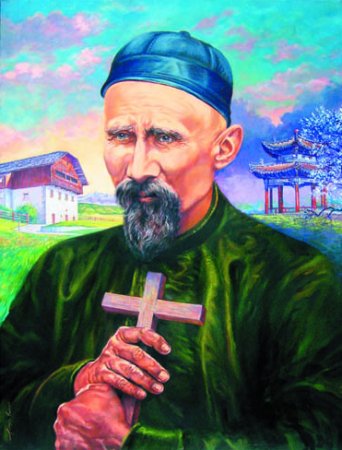Yaman, isang bukas na kalooban
Ang isang anim na taong gulang na batang babae ay pumunta sa isang malaking bangko at gustong makipagusap sa bank manager. Buti na lang andun ang isang mabait na clerk, kaya dinala siya nito sa pribadong opisina ng manager ng banko. Sa harap nito sinabi niya ang kanyang sadya: “kami po ng aking mga classmates ay naghahanda para sa isang Christmas party para sa mga batang katulad namin ang edad. Hihilingin po
May kabaitan din naman ang manager ng banko kaya, inilabas at ipinatong niya sa kanyang mesa ang isang sanlibong papel at isang sampong pisong barya, sa pag-aakalang di pag-iinteresan ng bata ang papel na pera. Kanyang sinabi, “Iha, pili ka ng isa.”
Dinampot ng bata una ang sampong pisong barya, at sinabi: “Turo po sa akin ng Nanay ko ay laging piliin ang pinakamaliit.” Pero kinuha rin niya ang sanlibong pisong papel at sinabi, “
Matalino ang batang ito sa ating kwento. Marunong siyang humawak ng pera. Sa ebanghelyo natin ngayon ay pinaaalalahanan tayo ng tamang paggamit ng pera o yaman. Tatlong bagay ang dapat nating tandaan kung tayo ay may hawak na pera o yaman.
Una, hindi atin ang pera o yaman. Iba ang may-ari nito. Tayo ay mga katiwala lamang sabi sa ebanghelyo, na maaring anumang oras ay ilipat ng may ari sa iba. Ito din ay paulit-ulit na ipinapangaral ng mga Obispo at Santo Papa. Katulad na lang ng Solicitudu Rei Socialis, ipinangaral ng Santo Papa na ang anumang bagay na sobra sa iyong pangangailangan ay hindi mo na pag-aari, ito ay laan para sa pangangailangan ng iba lalo na ng mga dukha. Sa Ingles ito ay tinatawag na “universal destination of the material goods” – ibig sabihin ang yaman ay para sa lahat. Ito ay bahagi ng Social Teachings or Doctrines of the Church, sabi nila the best kept secret of the Church. Pero kung tutousin, ito ay hindi naman talaga sekreto, sa katunayan, ito ay aking naranasan noong ako’y tumira ng dalawang linggo sa bundok ng
Pangalawa, huwag maging gahaman sa pera o yaman. “Aray ko po Pader... natamaan ako...” “Pader naman, pinaparinggan mu ata kami...” Huwag kayong mag-alala. Hindi kayo nag-iisa. Kahit noon pa man. Marami nang gahaman sa pera o yaman. Sa katunayan, si propeta Amos ay nagkakandailiti sa galit sa mga mayayamang Israelita noong panahon niya. Sa sobrang ganid at sakim sa kanilang kayamanan, akalain n’yo ba namang ipagyabang na tutubusin nila sa pagkaalipin ang isang tao sa halaga ng isang pares na tsinelas. Noon, hanggang ngayon at patuloy ang kasakiman ng tao sa yaman. Kaya, patuloy ding nagiging matalim ang turo ni Hesus na nagtatakwil sa mga gahaman at sakim sa pera at yaman, na walang inaatupag kundi ang magpakasarap. Ito ay siya nating maririning sa ebanghelyo sa darating na linggo.
Pangatlo, gamitin ng tama ang pera at yaman. Huwag waldasin, kundi gamitin ito para magkaroon ng bahagi sa kaharian ng Dios. Ito ang nais ipalaala sa atin ng talinghaga sa ating ebanghelyo tungkol sa matalino at matinik na tagapamahala. Ginamit niya ang ipinagkatiwalang ari-arian para masiguro ang kanyang sariling kinabukasan. Tulad ng tagpamahala, nais ni Hesus na gamitin din ng mga anak ng Dios ang yaman sa paglapit sa Dios. Papaanu?... Ipamahagi ito... Kundi baka ito ay maging pabigat lamang. Sabi nga ni Hesus, “It is easier for a camel to pass through the eye of the needle than for a rich man to enter the
Muli, ipinaaalala sa atin ng mga pagbasa na ang pera at yaman ay 1) hindi natin pag-aari 2) huwag maging gahaman sa pera at 3) ipamahagi ang yaman. Sa English ang tawag dito ay GENEROSITY. Sa Tagalog, pweding sabihing, BUKAS-LOOB... na siya ring diwa ng Pasko, na nakita ko sa isang kilalang kwento ng isang batang gumanap sa isang dula ng Panuluyan sa kanilang iskol. Siya ang gumanap na “innkeeper” na ang sasabihin lamang ay, “Pasensiya na po, wala na hong lugar sa bahay-pahingahan.” Sa gabi ng palabas ito ay kanyang buong pusong ginampanan, sa katunayan ang dula ay parang isang tunay na pangyayari. Kaya, matapos niyang sabihin ang kanyang linya, at makitang nalulumong umalis sina Maria at Jose, siya ay naawa at tinawag niya ito: “Maria, Jose.. Sandali!
Alalahanin po natin ang turo ni Hesus: “Tuluran ang mga bata...” maging bukas-loob.




